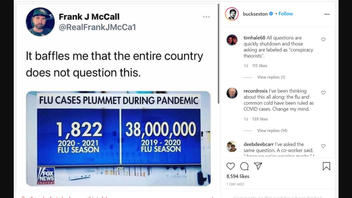
Does the fact that flu cases plummeted during the pandemic raise questions about infection statistics? No, that's not true: A post suggesting it should relies on misleading stats. It makes an apples-to-oranges comparison by considering laboratory-confirmed cases from "Week 10" of the as-yet-incomplete 2020-2021 flu season alongside the estimate of total cases from the entire 2019-2020 season. Regardless, it is true that flu cases dropped dramatically amid the pandemic. That can be attributed, in large part, to the fact that measures intended to help slow the spread of COVID-19 - including social distancing, mask-wearing, frequent hand-washing, and school and office closures - also reduced the spread of the annual influenza virus.
The claim appeared in an Instagram post (archived here) published on April 12, 2021. The post included what looked to be a screenshot of a graphic from Fox News. The graphic reported 1,822 flu cases during the 2020-2021 season and 38 million cases during the 2019-2020 season. Text atop the screenshot read:
It baffles me that the entire country does not question this.
Users on social media saw this:
The purported Fox News graphic cited as its source the U.S. Centers for Disease Control and Prevention (CDC), which puts out weekly reports on the flu.
Although the graphic did not include a date, we looked at several reports to find the one that had the 1,822 figure, which the graphic said was the number of flu cases in the 2020-2021 season. But on the CDC site, that number only matches the running total as of "Week 10," the week ending March 13, 2021. Through that week, the CDC reported a total of 1,822 laboratory-confirmed cases, as can be seen here.
An apples-to-apples comparison, then, would consider Week 10 data from the 2019-2020 flu season. For that week, ending March 7, 2020, the CDC reported a total of 262,196 laboratory-confirmed cases, as can be seen here.
Instead, the graphic -- and by extension the post -- compared the number of laboratory-confirmed cases for the 2020-2021 flu season to the CDC's overall estimate for the 2019-2020 season. On its website, the agency says:
During the 2019-2020 influenza season, CDC estimates that influenza was associated with 38 million illnesses, 18 million medical visits, 405,000 hospitalizations, and 22,000 deaths.
Again, that's an estimate, which is not the same thing as laboratory-confirmed cases. A comparison of those two types of numbers -- without explanation -- is highly misleading.
Regardless, it is true that flu cases plummeted amid the pandemic. That fall can be attributed, in large part, to mitigation measures intended to help slow the spread of COVID-19, including social distancing, mask-wearing, frequent hand-washing and school and office closures.
According to Eili Klein, an associate professor of emergency medicine at the Johns Hopkins University School of Medicine:
Though caused by a different virus from the one that causes COVID-19, the flu is also a respiratory viral disease, so everything we are doing to slow transmission of COVID-19 should also reduce transmission of flu.
Lead Stories has covered falling flu cases before. For that story, we spoke to the World Health Organization (WHO). In an email, dated October 28, 2020, the group said:
Global influenza activity has decreased. Additional analyses are needed, but it's hypothesized that this could be due to the public health and social measures put in place for COVID-19, viral competition/interference between SARS-CoV-2 and influenza, or a combination.
WHO added:
Influenza surveillance has decreased due to a variety of factors - resources diverted to COVID surveillance, changes in health-seeking behaviors, etc. However, despite the reduction in the number of countries sharing influenza data, we're confident in the data we have received, which has indicated influenza activity is at historic lows.
An uptick in flu vaccinations may have also helped to lower cases, at least in the United States. As of January 15, 2021, 193.2 million doses of flu vaccine have been distributed in the U.S., marking the highest number of flu doses distributed during a single flu season, according to the CDC.













